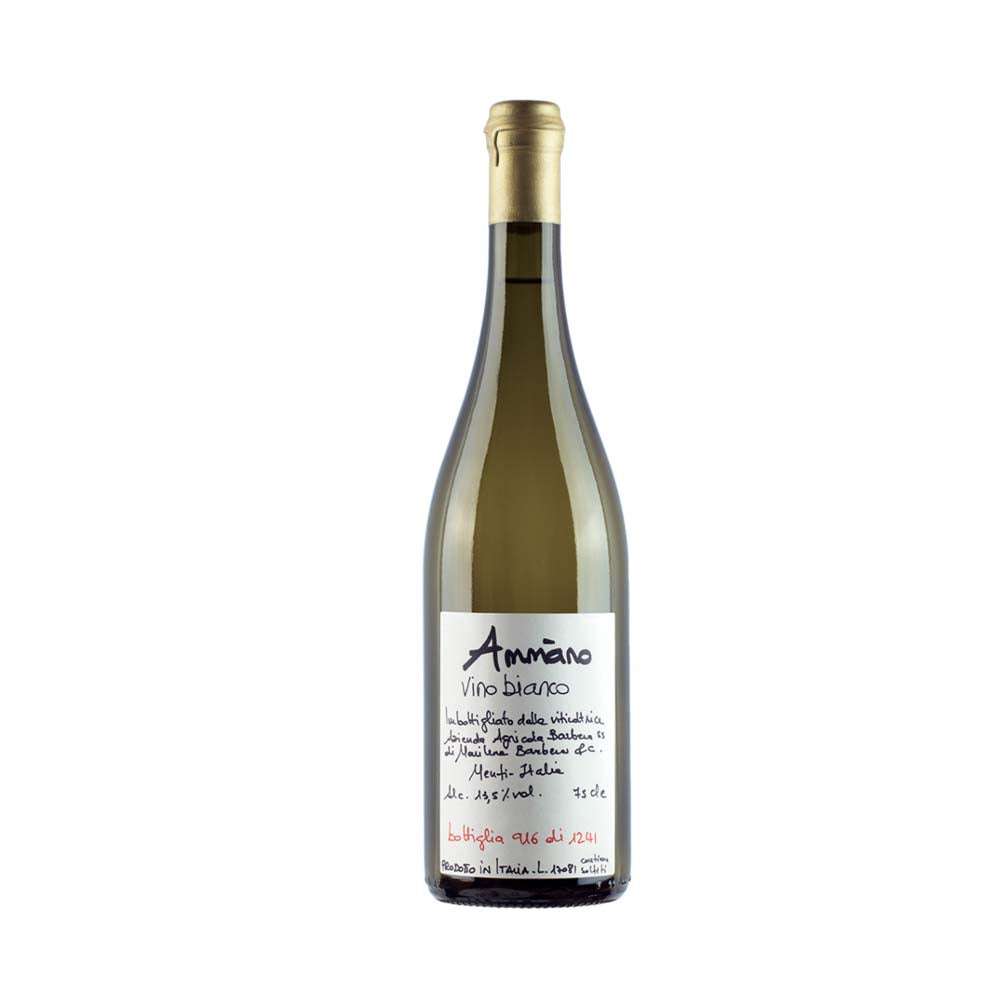
Ammàno | Cantine Barbera
TYPE: white
GRAPE: zibibbo 100%
ORIGIN: Italy, Sicily
AGEING POTENTIAL: 4 years
SERVING TEMPERATURE: 8-10° C
GLASS: 8-10° C
ALCOHOL: 12.5% vol.
FORMAT: 75 cl
THE WINE
TECHNICAL SPECIFICS
FRESHNESS: ◼︎◼︎◼︎◼︎◻︎
BODY: ◼︎◼︎◼︎◻︎◻︎
SAPIDITY: ◼︎◼︎◼︎◻︎◻︎
SOFTNESS: ◼︎◼︎◼︎◼︎◻︎
NOTES BY OUR SOMMELIERS
👁 a sunny golden yellow, slightly veiled;
👃🏻 in the nose it is intense and persistent, with a bouquet of broom and orange blossom, ripe apricot and balsamic notes of the Mediterranean maquis: thyme, marjoram, oregano and a touch of incense;
👄 in the mouth it is crisp, vibrant and direct, with a surprisingly brackish, very persistent finish.
FOOD PAIRINGS
Perfect with sea urchins, tuna roe or oysters, but also raw fish and prawns.
WINE-MAKING AND REFINEMENT
From grapes grown in the small vineyard of Contrada Torrenova (planted in 2008, espalier training system, Guyot pruning), with predominantly clayey soil, little skeleton, deep and free of stagnation, greenish in colour. The grapes are harvested by hand in the first half of September. The entire process is entirely manual, without the use of additives or machinery. Fermentation is spontaneous on the skins and lasts 7 days, in steel. After malolactic fermentation (spontaneous, entirely carried out), the wine matures for 4 months in 10-hectolitre barrels of unroasted Slavonian oak and is bottled with all its sediment, by gravity. The number of bottles produced each year varies from 1500 to 2000, depending on the vintage.
YOU WILL LOVE IT FOR...
its exuberance.
ORIGIN
TERROIR
Sicily is the southernmost region of Italy and the largest island in the Mediterranean. Around it there are several islands of volcanic origin, while the eastern part is characterised by the presence of Mount Etna.
The climate is predominantly Mediterranean, with hot summers and mild winters. In the coastal area, however, it is subtropical. The climate, in the presence of the high hills, from 500 metres above sea level, in the interior is milder and the average temperatures drop considerably.
Geologically, the Sicilian region belongs to the African plate. The only exception is the north-eastern part, that of Messina, which belongs to the Eurasian plate, formed by the Apennine-Maghreibian chain. The sliding of the African plate underneath the Eurasian one has determined not only the creation of the island's mountainous reliefs, but also the presence of frequent seismic activity, the causes of which are both tectonic and volcanic.
In particular, with the Barbera cellars we are in the Menfi DOC wine zone, one of the most interesting areas of Sicily. A borderland between the Phoenician and Greek worlds, it is the scene of precious biodiversity in an unspoilt corner of Sicily. We are in the province of Agrigento, where, defying the sirocco wind blowing from nearby Africa, reed thickets, sand dunes, dwarf palms, olive groves and vineyards covering some 6,000 hectares dominate. The DOC area in terms of soil and climate is the result of the combination and interaction of soils typical of the area (alluvial plains, marine terraces, clay slopes and hillsides and marly limestone) and soils (calcareous, silty, clayey, medium-textured, sandy as well as all naturally mixed soils) that make up a unique landscape, characterised in a decisive manner by a typically Mediterranean climate, with temperatures constantly above freezing, even in winter, with rainfall concentrated in autumn and winter, hot and dry summers but adequately ventilated and sunny for an environment particularly suited to the cultivation of vines. Both native varieties (inzolia, cataratto, grecanico, nero d'avola) and great international wines (chardonnay, cabernet franc, cabernet sauvignon, merlot) are grown here.
WINERY
Marilena Barbera returns to Menfi after 15 years of study and work away from her homeland, drawn by a visceral bond with Sicily. She took over her father's business and began to make her own wine, preserving tradition and interpreting it with creativity. He practices organic farming, with the utmost respect for the terroir: in the vineyard he does not use herbicides, chemical fertilisers or systemic products. In the cellar only spontaneous fermentation and non-invasive oenological practices, paying extreme attention to the personality of the grapes. Her wines are the distillate of a territory, interpreted by the strength of the ideas of a visionary winemaker.

When will I receive my order?
If the bottle is in stock it will be sent immediately and you will receive it in a couple of working days.
Is the order renewed?
No, this product is not bound by any type of subscription and cannot be renewed.
Is there a minimum number of bottles?
No, you do not have to order a minimum quantity of bottles: you can choose to receive just one bottle of each type.

This product has no reviews yet.
